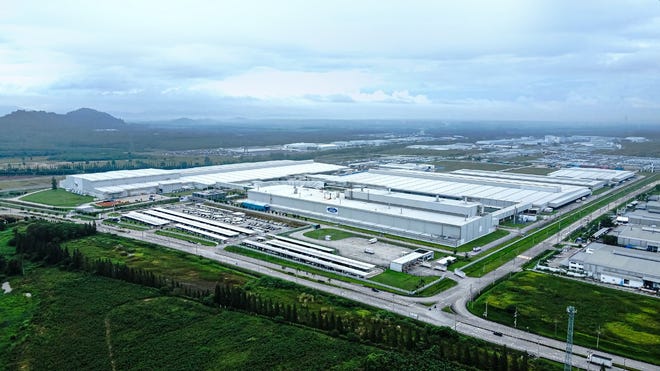Ford Motor Co. this week announced it will spend $900 million to modernize its Thailand manufacturing operations, marking the automaker’s largest-ever investment in the Southeast Asian country where it has two assembly plants.
The investment will support production of the next-generation Ranger pickup truck and Everest SUV and add up to 1,250 jobs. It brings Ford’s investments in Thailand to more than $3.4 billion over its 25-year history in the country, according to the company.

“This is an important milestone to build on our quarter-century of commitment to producing vehicles in Thailand, enabling us to further modernize and upgrade our local operations, and support production for the exciting upcoming launch of the next-gen Ranger, one of Ford’s highest volume and most successful vehicles anywhere in the world, and the next-gen Everest SUV,” Yukontorn “Vickie” Wisadkosin, president of Ford ASEAN and Asia Pacific Distributors Markets, said in a statement.
Ford executives said the investment is part of the company’s turnaround plan, under which the automaker has realigned its manufacturing operations in several regions. In September, for example, Ford announced it would cease manufacturing operations in India. Earlier this year, it said it would stop producing cars in Brazil. Meanwhile, it has bolstered its operations in South Africa.
Ford sells vehicles locally in Thailand, and also uses its manufacturing operations there as an export base for global markets. It operates the wholly-owned Ford Thailand Manufacturing Plant, which opened in 2012, as well as the joint-venture AutoAlliance Thailand truck plant that opened in 1995. The investment will support the addition of a second shift at Ford Thailand Manufacturing, bringing Ford’s workforce in Thailand to more than 9,000 employees, the company said.
Ford committed approximately $400 million to investments in the local supply chain “to localize and enhance the quality of vehicle parts and design related tools,” supporting the creation of about 250 new jobs, according to a news release.
The investment will be used to upgrade Ford’s manufacturing facilities in Thailand by adding what it described as “state-of-the-art” manufacturing technologies and accompanying training for Ford employees and suppliers.
The automaker, for example, plans to nearly double the number of robots at both of its plants in Thailand with the addition of 356 robots to be used in the body and paint shops. The company said this would bring the level of automation at the body shops in the Ford Thailand Manufacturing and AutoAlliance Thailand plants to 80% and 69%, respectively, up from 34%.
The upgrades also will include the implementation of ScanBox technology, which Ford described as a “surface scan capability” that improves the time needed to accurately measure a vehicle.
The automaker also is improving its capability for multi-variant truck production in the Ford Thailand Manufacturing Plant. The upgrade will enable the plant to produce multiple cab styles on the same production line, which Ford said “allows more flexibility in planning and scheduling so the plant can react more quickly to customer demand and reduce customer waiting time for a new vehicle.”
The next generation of the Ranger, which will be built at both Thailand plants, is slated to launch in mid-2022. The truck is sold in more than 180 markets around the world. It is also produced in Michigan and South Africa.
The AutoAlliance Thailand plant, meanwhile, will be the lead production hub for the next generation of the Everest SUV, which Ford sells in the Asia-Pacific region but does not offer in the U.S.
jgrzelewski@detroitnews.com
Twitter: @JGrzelewski